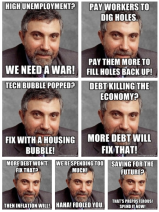

Paul Krugman, partisan economist and professor at Princeton University, gives a speech on May 12, 2009 in Shanghai, China. (Photo by Zhu Lan/ChinaFotoPress/Getty Images)
I sometimes feel guilty when commenting on Paul Krugman’s work. In part, this is because I don’t want to give him any additional attention, but mostly it’s because it’s too easy. Like shooting fish in a barrel.
His advocacy of Keynesian economics, for instance, makes him a very easy target.
And it’s always amusing to cite his words when exposing horror stories about the U.K.’s government-run healthcare system.
That being said, I feel obliged to write about Krugman when he attacks me or the Cato Institute.
- He bizarrely claimed that California’s 46th-worst job performance among states somehow was proof that I was wrong to criticize a big tax hike.
- He incorrectly asserted that Cato supported the laws and policies that were in place before the financial crisis, and compounded that mistake by arguing that the financial crisis was proof that free-market policies (which didn’t exist) don’t work.
Now he’s attacked Cato again and he looks like an even bigger fool.
Here’s some of what he wrote on May 15.
David Glasner has an interesting post about how the Cato Institute suppressed an old paper of his, refusing either to publish it or release it for publication elsewhere, not for a few months, but for decades. What Glasner may not know or recall is that Cato has a long-standing habit of trying to send inconvenient history down the memory hole.
When I first read that, I wondered why this was a bad thing. After all, should Cato be obliged to publish articles if we don’t fully agree with them?
But perhaps we had made some sort of commitment and were guilty of reneging. That certainly wouldn’t reflect well on us. So was Cato indeed guilty of spiking a paper we had promised to publish?
Nope.
On the same day that Krugman published his attack, Mr. Glasner published a correction. After emailing back and forth with the relevant person at Cato, he acknowledged that “my recollection of the events I describe was inaccurate or incomplete in several respects” and that “Cato did not intend to suppress my paper.”
Since Krugman wrote his attack on Cato before Glasner wrote his correction, one presumably could forgive Krugman for an honest mistake. After all, surely he would immediately correct his column, right?
Nope.
On May 19, Jonathan Adler wrote about Krugman’s unseemly behavior in the Washington Post.
Krugman’s charge is false… As Glasner recounts in an update to the post that Krugman cited, the initial allegation was based upon a misunderstanding. Cato had not sought to suppress Glasner’s paper. Indeed, Cato had offered to publish it, albeit not as quickly as either Cato or Glasner had hoped. Once this was cleared up, Glasner forthrightly acknowledged the error. “Evidently, my recollection was faulty,” Glasner wrote. Krugman, however, has yet to update his post.
Wow. That doesn’t look good for Krugman.
But perhaps Adler’s comments had an impact because Krugman did add an update to his post.
In an amazing bit of chutzpah, however, he said it didn’t matter.
Glasner has retracted, saying he got his facts wrong. Unfortunate. It has no bearing on what I wrote, however.
Wow again.
I can understand that it’s no fun to admit mistakes. I’ve had to do it myself. More than once.
But you own up to errors because it’s the right thing to do.
 Ethical behavior, however, is apparently not necessary if your Paul Krugman.
Ethical behavior, however, is apparently not necessary if your Paul Krugman.
By the way, Krugman also attacked Cato in his column for supposedly trying to “pretend that they had never used the term privatization” when writing about Social Security personal accounts.
I’m not sure why this is supposed to be damning. All groups try to come up with terms and phrases that work best when trying to advocate particular policies.
So if Cato people decided to write about Social Security personal accounts instead of Social Security private accounts, the only crime we were guilty of is…gasp…marketing.
P.S. I’ve had some fun over the years by pointing out that Paul Krugman has butchered numbers when writing about fiscal policy in nations such asFrance, Estonia, Germany, and the United Kingdom.
P.P.S. In addition to defending Cato, I’ve also had to explain why Krugman was being disingenuous when he attacked the Heritage Foundation.






